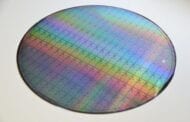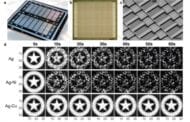The technology has promising applications beyond memory storage
The first purely silicon oxide-based ‘Resistive RAM’ memory chip that can operate in ambient conditions – opening up the possibility of new super-fast memory – has been developed by researchers at UCL.
Resistive RAM (or ‘ReRAM’) memory chips are based on materials, most often oxides of metals, whose electrical resistance changes when a voltage is applied – and they “remember” this change even when the power is turned off.
ReRAM chips promise significantly greater memory storage than current technology, such as the Flash memory used on USB sticks, and require much less energy and space.
The UCL team have developed a novel structure composed of silicon oxide, described in a recent paper in the Journal of Applied Physics, which performs the switch in resistance much more efficiently than has been previously achieved. In their material, the arrangement of the silicon atoms changes to form filaments of silicon within the solid silicon oxide, which are less resistive. The presence or absence of these filaments represents a ‘switch’ from one state to another.
Unlike other silicon oxide chips currently in development, the UCL chip does not require a vacuum to work, and is therefore potentially cheaper and more durable. The design also raises the possibility of transparent memory chips for use in touch screens and mobile devices.
via UCL News
The Latest Streaming News: Memory Storage updated minute-by-minute








